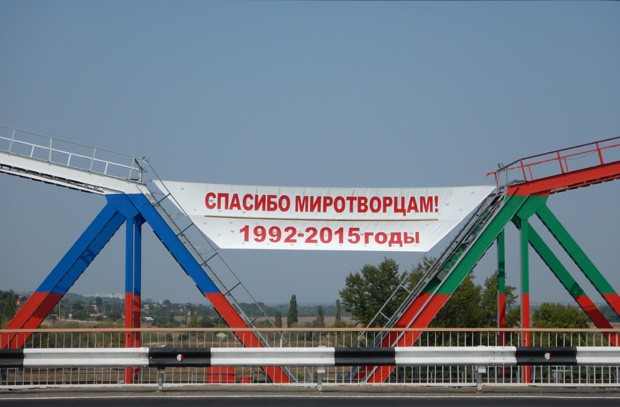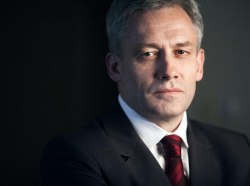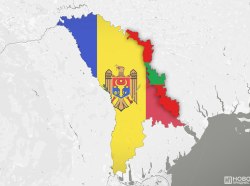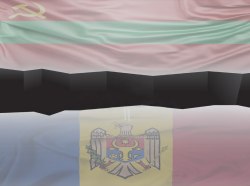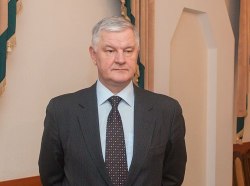Russian Planet found out how the non-recognised Pridnestrovian Moldavian Republic, which marked its 25the anniversary on 2 September, lives today.
A young Moldovan policeman looks into our minibus, parked near Kishinev Airport, surveying the passengers.
«Where are you going?»
«Pridnestrovie.»
"They are having a holiday tomorrow, aren't they? What holiday?"
«Republic Day.»
«How old is the republic?»
«Twenty-five.»
"Good for them," grimly states the policeman and closes the door.
Less than an hour later we will really be in the non-recognised Pridnestrovian Moldavian Republic, which has been asserting its right for independence over the past 25 years and throughout these years seeking recognition and the joining to Russia. The phrase «Pridnestroie is part of the Russian World» may have already become a journalistic cliche but has not lost its meaning. This statement is more than correct and over these years the feeling of indissoluble connection between Pridnestrovie and Russia has not weakened but got even stronger, despite all difficulties.

© Photo: Darya Andreeva / rusplt.ru
Moldova puts obstacles
The unfriendly attitude of the policeman towards Pridnestrovie is a vivid example of Moldova's official position. Recently there have been frequent cases when Moldova forbids its territory and deports the Russian citizens who are going to or have already visited Pridnestrovie. This practice is especially applied to journalists and political experts. The situation is aggravated by the fact that Russian citizens can now get to Pridnestrovie only via Kishinev because the passage through the Ukraine-Pridnestrovian border is closed for them now.
Unfortunately, I and my colleagues faced the attempt aimed at either preventing us from visiting Pridnestrovie or just frightening us. After we had already gone through passport control, a border police officer came up to us, took away our passports and demanded that we admit we represent the Russian mass media and produce documents confirming this. «What are you going to do in Pridnestrovie? We'll send you right back," he threatened. We were taken to the examination zone, asked to open our bags, then asked to produce our press cards again and at last let us go, promising they would be watching our actions in Pridnestrovie.» They meant reports and articles about Pridnestrovie. However, on our way back there were no problems or questions to us. But someone was not so lucky. On 4 September Moldova forbade the country to the South Ossetian foreign minister, Kazbulat Tskhovrebov, and the SO MP, Igor Kochiev, for the period of 10 years. The delegation of South Ossetia came to celebrate the 25th anniversary of the Pridnestrovian Moldavian Republic. Kishinev clarified that the non-recognised republics «discussed a draft of a friendship and cooperation agreement that includes a provision on military cooperation and joint exercises.» And on 7 September Russia's LifeNews camera crew was banned from entering Moldova during passport control. The journalists were threatened «to be given to Ukrainian colleagues», deprived of a flash drive with a recorded report and told to go back to Moscow at their own expense.
According to Pridnestrovie's foreign minister, Nina Shtanski, there were cases when the Russian citizens residing in Pridnestrovie were deported. It is hard to imagine what this verdict may mean for a person who cannot get home.
«Where in the world is a man deported so that he could not get home? This goes counter to the generally recognised logic of legal processes. The deportation is a terrible word for many Pridnestrovians, Russian citizens, because they cannot to go to Russia via Ukraine either," said Nina Shtanski.
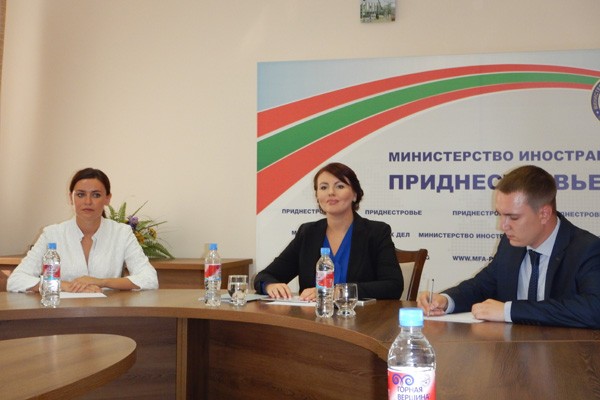
Pridnestrovie's Foreign Affairs Minister Nina Shtanski (center). © Photo: Darya Andreeva / rusplt.ru
Moldova's preventing journalists and public figures from visiting the PMR is another factor of the blockade. There is not only economic or political blockade, but also information one. The risk to be deported seriously influences the decision whether to go to Pridnestrovie or not. Of course, this is not Moldova's independent policy, and, in fact, this is its voluntary unilateral isolation. Cutting off those who could assist in settling the Pridnestrovian conflict and who may be visiting the republic with this purpose as well, Moldova scores an own goal.
«If everyone is prohibited to go to Pridnestrovie, if someone is deported, the other will not want to go, and this is always the choice for an expert and a journalist — whether to deal with this story or not. But the life never stands still. It may well happen that Moldova will need these very experts in the near future as transmitters of its own interests, and it is them whom the country will send a SOS signal," believes Nina Shtanski.
Priceless cargo duplicate
The Pridnestrovian residents have Russian, Moldovan, Ukrainian and Pridnestrovian passports, and someone may still have a Soviet one. Since 2006 there has been an ambulatory consular office in Tiraspol. Until that the Pridnestrovians had to go to the Russian embassy in Kishinev to apply for the Russian citizenship. From 2006 to 2011 there was a simplified order of acquiring the Russian citizenship, and 95,000 persons took advantage of this opportunity. The Pridnestrovians do not get Russian domestic passports, they get foreign passports confirming their citizenship.
According to available data, there are 200,000 Russian passports registered Pridnestrovie. There are also 80,000 Ukrainian citizens. Public organisation Ukrainian House provides ambulatory consular services for them. It is difficult to determine the number of Moldovan citizens as there is no official registration. According to Nina Shtanski, the Moldovan authorities had long forborne to announce any figure when at last the ex-premier, Iurie G. Leanca, declared there were more than 350,000 Moldovan citizens in Pridnestrovie. This includes almost all the population: pursuant to the results of the latest population census, there were 550,000 residents in 2004, but since then the population is likely to have decreased. The new census, which takes place quite soon, will show to what extent. It is known that from 1989 to 2004 the number of the Pridnestrovians dropped by 200,000 persons. Kishinev seems to consider all Pridnestrovian residents to be citizens of Moldova. Of course, there are many Moldovan citizens, Nina Shtanski underscores, but very often it is not a person's free choice.
«It was very difficult to acquire the Russian citizenship until 2006. And now there is a long queue to Tiraspol's consular office. If a person wants to apply for the citizenship now, he will be put on the list and admitted only in next August, almost in a year. Many people cannot wait so long," says the foreign minister. If everything goes all right, people wait for their passport. Fortunately, now it is possible to apply for children's citizenship in Tiraspol, and earlier this procedure was only possible in Kishinev, and the remoteness could also affect the choice of young parents. Many issues have already been solved. But if something has gone wrong, if it is necessary to enter a university and this cannot be delayed for a year, or if there are health problems and it is necessary to go away to Russia for treatment, there is an acute necessity of getting a foreign passport. The fact is, Pridnestrovie cannot provide high technology medical assistance to its oncology patients: since the republic is not recognised, medical equipment with radioactive elements cannot be used in its territory. In such cases patients have to go to Moldova and get a Moldovan passport there, which makes them impossible to renounce the Moldovan citizenship in the future.

© Photo: Darya Andreeva / rusplt.ru
«Pridnestrovie's MFA has already received thousands of complaints from those who became a Moldovan citizen until 2006 and now cannot refused it and acquire the Russian citizenship. This a Catch 22 situation. The Moldovan passport is a compulsory and, unfortunately, irrevocable measure for a majority," states Nina Shtanski.
It is evident the problem of acquiring the Russian citizenship is long overdue and needs to be tackled. To speed up the process, a consular office staff increase only is not enough, there is also a need for legislative initiatives, and some steps have already been made in this respect. Thus, the vice premier, Dmitriy Rogozin, has come up with the suggestion to simplify the acquisition of the Russian citizenship for the Pridnestrovian residents. The necessity of approving this legislation is long overdue, and not only for the residents of this non-recognised republic, but also for Donbass and other parts of the Russian World. Taking into account global tensions, the Russian passport is in many respects a guarantee of protection and support. It is very pitiful to hear undoubtedly sincere patriotic speeches and watch bureaucratism in practice.
Young Pridnestrovie
Despite all political and economic difficulties, there are very many young people in the streets, including young couples with two, three children. This is what not every Russian and particularly European city can boast about.
Of course, as is everywhere, there is an exodus of the most active young people aged 17−35. The beauty of local girls also affects the demography: they often marry foreigners and leave. But there are also those who purposely remain.
We saw several marriages in Bendery. This is how one of newly married couples explained their choice: Dmitry, 29, and his chosen one, Polina, 20. They plan to live on in Bendery, create a family and, of course, have children — the more the better. «This is our Motherland, our life and our relatives are here. We do not need foreign countries and foreign people — only if going sightseeing as tourists. We were borne here and we do not want to leave. Of course, every family has its own problems and everyone knows the situation in Pridnestrovie, but we live well here and don't need anything. We live, enjoy life, get married," replies Polina.

Polina and Dmitry, just-married couple from Bendery. © Photo: Darya Andreeva / rusplt.ru
We feel better here than do the Moldovans and Ukrainians, our situation is more favourable here than in the neighbouring states," added Dmitriy.
Meeting the students of Shevchenko Pridenstrovian State University left the warmest impressions. The young political scientists and journalists realise their role in today's information confrontation and seeking self-fulfilment in this field. Naturally, many future and present students want to study and gain experience in Russia, but after that they want to apply their skills for the benefit of their Motherland.
Pridnestrovie is 25 and the whole generation of those who do not remember the Soviet Union and the developments related to the independence struggle have grown up in these years. In the PMR, young people consider themselves the Pridnestrovians, and it is they who will influence the life of the republic in some 10−20 years.
On the anniversary the Women's Photographic Union organised the exhibition «Peers of Pridnestrovie» in the Palace of Republic. This exhibition and literature project, carried out under the auspices of media centre Eurasian Pridnestrovie, introduces Pridnestrovie's age-mates to the audience. Among them are champions masters of sports, doctors and nurses, kindergarten and school teachers, bank employees, confectioners and metallurgists, journalists and artists belonging to different nationalities: Ukrainians, Russians, Moldavians and so on. They are united by the age, 25, and being Pridnestrovians. In fact, this is a contemporary variant of a Soviet-style Our Pride showcase. All project participants answered the same very important question: «What does being a Pridnestrovian mean to you?»

Exhibition «Peers of Pridnestrovie». © Photo: Darya Andreeva / rusplt.ru
«Being a Pridnestrovian is to feel your alienation from the world, to be the one nobody takes account of. And this is a splendid opportunity to surprise, astonish and pride myself. The most unbelievable things are created only by those who haven't been paid attention to," said Alexander Zinchenko, a Pridnestrovie's First Channel host.
These words give very exact characteristic of the Pridnestrovian Moldavian Republic.
The article has been prepared under the auspices of the Gorchakov Foundation as part of the press tour of CIS journalists in Pridnestrovie.

